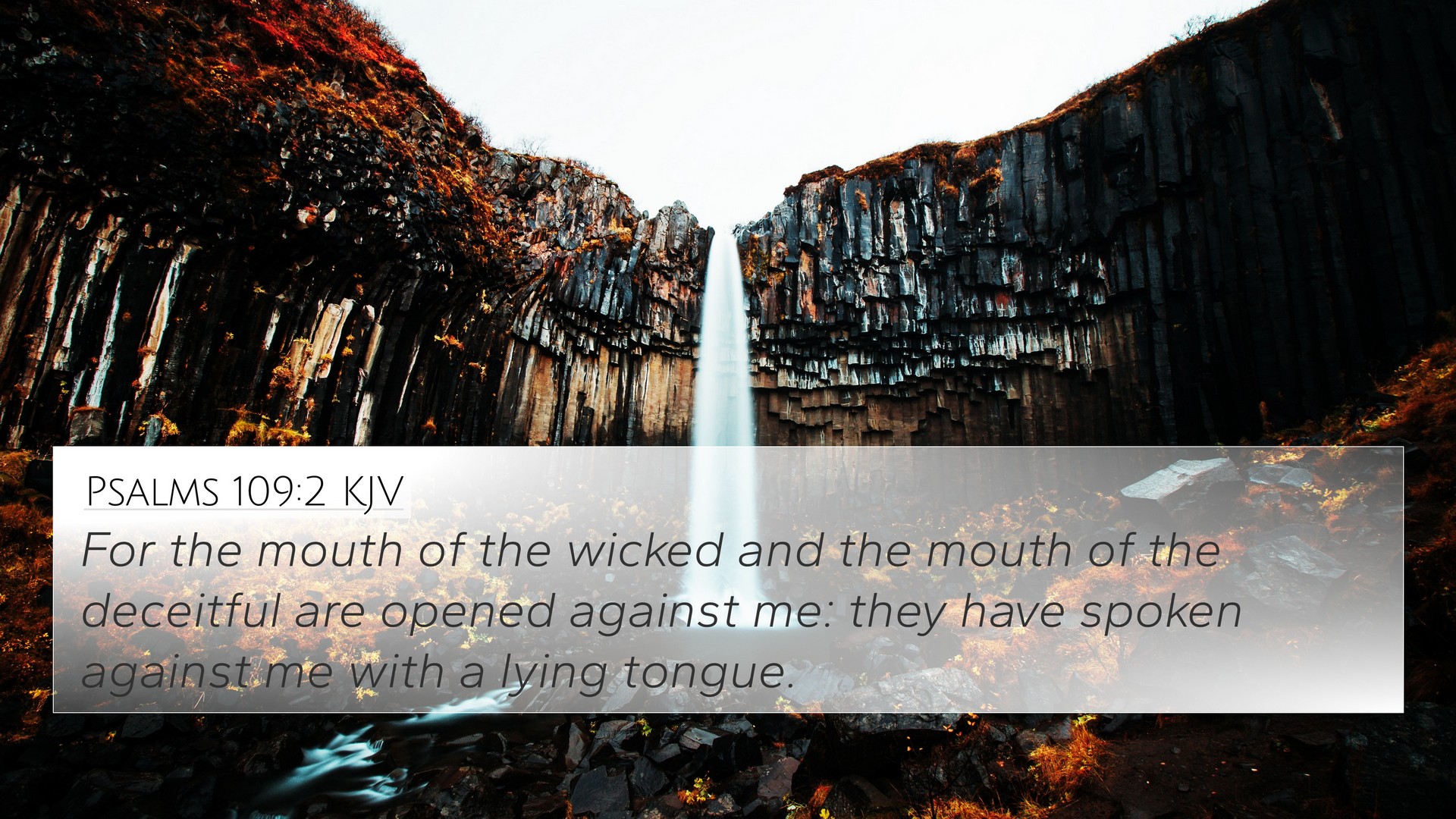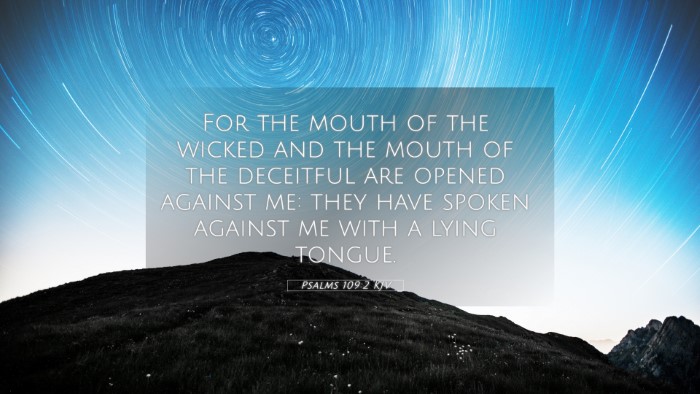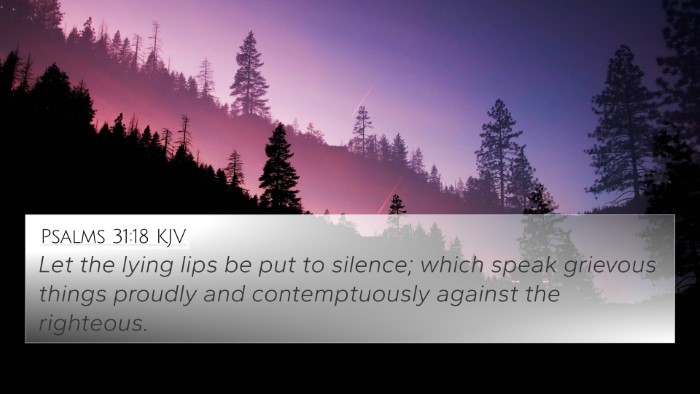Understanding Psalms 109:2
Psalms 109:2 states, "For the mouth of the wicked and the mouth of the deceitful are opened against me; they have spoken against me with a lying tongue." This verse encapsulates a powerful message about the challenges posed by adversaries and the nature of their accusations. Drawing insights from notable public domain commentaries, we can explore its deeper meaning.
Insights from Matthew Henry
Matthew Henry emphasizes the distress that the psalmist feels from the slanderous words of the wicked. He points out that the psalmist is not merely presenting a personal grievance but expressing a broader struggle against the sinister forces of deceit in the world. Henry reflects on how these adversarial words can wound the spirit and calls attention to the importance of presenting one’s plight before God.
Insights from Albert Barnes
Albert Barnes takes a historical lens, discussing how accusations are a common tool used by the wicked throughout scripture. He notes that the "lying tongue" is a characteristic of evil, and recognizing the nature of such opposition is crucial for believers. Barnes suggests that even in hardship, the faithful can find comfort in God's eventual vindication, provided they maintain their righteousness.
Insights from Adam Clarke
Adam Clarke elaborates on the significance of speech in this verse, linking it to spiritual warfare. He posits that words have profound power and can create realities. Clarke underscores that the psalmist's lamentation is a spiritual plea for protection against the very real threats posed by falsehoods. He encourages readers to reflect on how untruths can devastate lives while reinforcing the necessity of truth in one's walk of faith.
Connections to Other Scriptures
Psalms 109:2 is deeply interwoven with various biblical themes and verses. Here are some important cross-references:
- Psalms 34:13-14: "Keep your tongue from evil, and your lips from speaking deceit." This verse complements the theme of guarding one's speech against wickedness.
- Proverbs 12:22: "Lying lips are an abomination to the Lord, but those who act faithfully are his delight." Highlights the contrast between wicked speech and righteous integrity.
- Matthew 5:11-12: "Blessed are you when others revile you..." Jesus speaks directly to the suffering caused by deceitful speech, echoing the sentiments found in Psalms 109.
- James 3:6: "The tongue is a fire..." This verse indicates the destructive power of words, aligning closely with the theme of the psalmist’s lament.
- Psalms 63:11: "But the king shall rejoice in God; all who swear by him shall exult..." A reminder of the ultimate triumph of the righteous over the wicked.
- Romans 3:13: "Their throat is an open grave; they use their tongues to deceive..." Paul draws on the idea of deceitful speech prevalent among the wicked.
- 1 Peter 3:10: "For whoever desires to love life and see good days, let him keep his tongue from evil..." This verse acts as a practical guide for avoiding the pitfalls outlined in Psalms 109:2.
Thematic Connections
This verse can be understood within the broader theme of conflict between good and evil, truth and falsehood. The psalmist's cry reflects not only personal anguish but also a universal experience faced by the righteous against the backdrop of deceit. The connections between these verses remind us of the consistent biblical teaching on the nature of sin and the perennial struggle against it.
Reflections on Handling Adversity
Psalms 109:2 serves as a poignant reminder for believers today. In our lives, we too face challenges posed by those who may speak ill of us or misrepresent our character. The themes of slander and deceit resonate throughout scripture, and the biblical answer involves seeking refuge and vindication in God. It prompts believers to respond not with retaliatory words but through prayer, maintaining integrity, and trusting in divine justice.
Using Biblical Cross-References
To fully grasp the breadth of Psalms 109:2, engaging in a cross-referencing study enriches understanding and fortifies faith. Tools such as a Bible concordance or a cross-reference Bible study guide can be invaluable for identifying connections between biblical texts. They help illuminate themes of righteousness, the power of words, and the nature of evil throughout scripture.
Understanding how to find cross-references in the Bible allows one to deepen their study, offering a comparative analysis amongst scripture passages, including a detailed cross-reference between the Gospels and the teachings found in the Prophets. As believers develop their ability to engage in scriptural cross-referencing, they also uncover a dialogue that transcends the testaments, knitting together a cohesive story of divine interaction with humanity.
Conclusion
In summary, Psalms 109:2 speaks to the troubled soul facing deceit, a message that resonates throughout scripture. Commentaries by Matthew Henry, Albert Barnes, and Adam Clarke invite us to reflect on our own reactions to adversity and the importance of relying on God amidst slander. Cross-referencing this verse with other related passages allows for a deeper, richer understanding of its implications in one's life today.

















